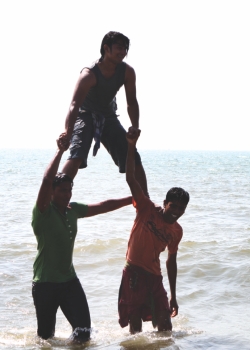|
Young Voices
Home Unsafe?
Naziba Basher
Photos: Zahedul I Khan
Sadness prevailed upon Bangladesh when four young boys set out to sea to create unforgettable memories with friends and colleagues, and instead faced disaster at Cox's Bazaar on July 29, 2011.
Abid, Ashik, Saffat and Muttakin were on a trip with their advertising agency, Mattra. On the evening of July 29, the four friends decided to go for a dip whilst the rest of their colleagues were playing football on the shore. As they went towards the sea asking for more companionship and saying 'goodbye' in a 'you're missing it' manner, little did they know that this 'goodbye' may be their last. Saffat was the only one who could save his own life but for his three other friends, it was too late. Their colleagues and friends watched them get lost into sea and tried keeping the last glimmer of hope in their searching eyes as they tried to find them. And just like that, they were gone.

Located along the Bay of Bengal in South Eastern Bangladesh, Cox's Bazaar Town is an attractive port and health resort. But it is mostly famous for its longest natural sandy beach. The municipality covers an area of 6.85 km² with 27 mahallas and 9 wards and has a population of 51,918. Cox's Bazaar is connected by road and air with Chittagong. Every year, Cox's Bazaar is filled with tourists from various countries and even locals who want to enjoy a sunny vacation at the longest beach in the world. But being one of our prestigious belongings and a matter to brag about on a world scale, we still have to live with the burden of irresponsibility, injustice and danger while we try to collect votes for it to be considered as one of the wonders of the world. In the last few years, many have died in the danger zones of Cox's Bazaar, most of whom were students vacationing during their mid-semester breaks.
"I have been to Cox's Bazaar on holiday. One of the first things that struck me was a signboard near the beach. I remember it clearly saying, 'Abogahoner jhuki niben na. Uddhar bebostha nai- Saikat Police' (Do not take the risk of bathing in the sea. We do not have a rescue system- Bay Police)," says Zahed Farid, an engineer.
 As tourists from all over the world visit the country even after our alarming crime rates, political hazards, pollution, heat and traffic, we still cannot seem to promise them a healthy and safe stay due to the ignorance of our people, the ignorance of our government. As a matter of fact, how can we expect others to step into our homeland when we are risking our own lives for a level of enjoyment while living in our own country? One might wonder, if you do not have a rescue system, then why keep the beach open? Why let people risk their lives in the first place? Is one signboard supposed to save lives? When these questions come to mind, we the citizens are struck by shame, but to the rest of this country, it is just another life lost. As tourists from all over the world visit the country even after our alarming crime rates, political hazards, pollution, heat and traffic, we still cannot seem to promise them a healthy and safe stay due to the ignorance of our people, the ignorance of our government. As a matter of fact, how can we expect others to step into our homeland when we are risking our own lives for a level of enjoyment while living in our own country? One might wonder, if you do not have a rescue system, then why keep the beach open? Why let people risk their lives in the first place? Is one signboard supposed to save lives? When these questions come to mind, we the citizens are struck by shame, but to the rest of this country, it is just another life lost.
A telecom company had taken the initiative of setting up a watchtower at Cox's Bazaar through which one may get some sense of assurance during a weekend away at the beach. Where were the watch tower authorities when Abid and his friends were having their lives snatched away by the sea? Saffat, being the only one who could swim, had tried saving his friends and was the one to bring Muttakin's body to shore with no help from the lifeguards because apparently, they do not offer services after sunset. Is setting up watchtowers enough to save people?
"I was terrified by the very sight of them as their bodies were being rushed to the van," says Nazia Rahman, a friend of the boys who was also holidaying at the beach. "There was nothing we could do then but there should have been someone to save them. They would have lived a long, healthy life if only we had lifeguards like every other beach around the world.
Quicksand or tidal waves, there may be more than one reason for people to drown in the sea. But the whole point of an open beach is so that people can enjoy with a sense of safety. It is now obvious to us and the rest of the world, that we, the citizens are not safe in our country.
There is, of course, no way to tell when one's life will seize to exist. Anything can happen at anytime and that is exactly what we all have known since we were children. But when you know that things could have turned out differently, why do we still have to worry about our lives and that too, on our own grounds?
As families of the three young boys, Abid, Ashik and Muttakin, mourn their deaths, the whole country is left in wonder as their thoughts are conquered by the words, 'only if...'
|
Copyright (R) thedailystar.net 2011 |
